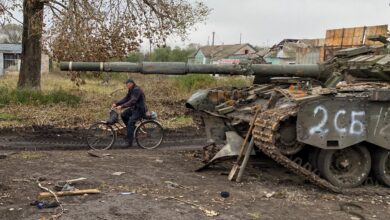‘Each day it is getting worse’: Fighting to save lives on Ukraine’s bloodiest battlefield

The moment the firefighters got the call that central Bakhmut had been hit by a massive Russian artillery strike, another rocket ripped open the sky, landing less than a metre from their station and trapping the only people who could help the frontline Ukrainian city.
With the street ablaze outside, and the gates mangled shut, the first responders had to use their fire engines to ram through the metal shutters to get out.
“The only way was to drive through fire to get to the other fire,” says Major Yuriy Galich, the 37-year-old department chief, intermittently interrupted by the sound of shelling.
“And each day it is getting worse. Last week we got 10 separate calls about 10 different fires happening simultaneously but again, we couldn’t even get out of the station. Like so many days, if we had left we would have been instantly killed.”
The fire department of the eastern city of Bakhmut – depleted in numbers and in fire trucks – is one of the few remaining forces protecting residents.
The firefighters now not only put out blazes but also have an ambulance and give life-saving first aid. They do evacuations and medical transfers to nearby key cities, all while under intense bombardment themselves. At the moment they are operating with only two fully functioning fire trucks, compared with eight before the war.
This is because Bakhmut, once a city of 80,000 people but now home to an eighth of that, and the nearby town of Soledar, have become the epicentre of Russia’s bloody invasion of Ukraine.
As Putin loses ground in the north and south, the east has become the focus of Moscow’s fury, and the area is an invaluable gateway to the rest of the strategic Donbas region. If Russia gained control of Bakhmut and Soledar it would give Moscow a stepping stone to advance on two of the bigger cities, Kramatorsk and Slovyansk. It would also deprive Ukraine of a vital road and rail supply line intersection.
And so, this key area has been pounded by Russia for five months, leaving a landscape pockmarked by shelling. On the ashen road into Bakhmut, most of the sporadic traffic comprises tanks and military cars, while the city’s buildings bear the scars of the months-long bombardment. Across the river which splits Bakhmut in two, Russian snipers have started taking potshots at civilians.
Against that backdrop, residents on bicycles pick their way through the ruins on the hunt for supplies. They barely flinch when shells land deafeningly close, sending smoke into the fog and ash and dust.
This battle for Bakhmut, a town that has held on since May, has morphed into a symbolic battle of Ukraine’s entire fight for survival. So much so that Volodymyr Zelensky mentioned the city – calling it “the fortress of our morale” – during a speech in Washington DC on Wednesday on his first trip outside of Ukraine since Moscow invaded in February.
It followed his recent visit to Bakhmut where he said that the only reason the east had been holding out was because Bakhmut was fighting back.
“In fierce battles and at the cost of many lives, freedom is being defended here for all of us,” he wrote in a social media post.
And that bitter battle continued this weekend with Russian forces, backed by mercenary groups such as Wagner, pounding Ukrainian positions in an attempt to edge forwards.
The commander of Ukraine’s “Freedom” battalion, Petro Kuzyk, helping to defend the city, said this week the fighting had been so intense every day the Russians launched “anywhere from seven to 10 attempts to storm our positions”.
A critically injured patient is transferred by Kroha’s team near the frontline in Donbas
Back at the fire department, Major Galich, who has been in the job for 15 years, knows that means even deadlier missions for his teams. They have already lost one firefighter, a young man called Ilya who was killed in the autumn just a few weeks after he had signed up. The young man was trying to check a building that had just been hit when shelling rained down again.
“We tried so many times to get to him but the shelling was so hard we couldn’t get there,” Galich adds with a swallowed pause.
“He was dying and we just couldn’t save him. That was probably the worst moment of the war.”
Work here is like a conveyor belt, Kroha, a volunteer medic, says wearily, as a military ambulance arrives. Suddenly everyone is frantic. Paramedics spill out of the khaki vehicle clutched around a blood-soaked stretcher. More doctors melt out of the walls to meet them in the doorway.
The head of Bakhmut’s fire department stands beside where a rocket hit their station
What keeps me going? My son gives me strength.





